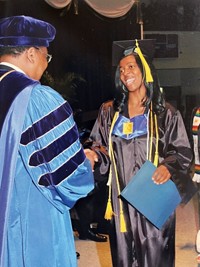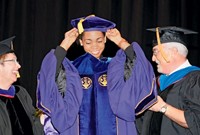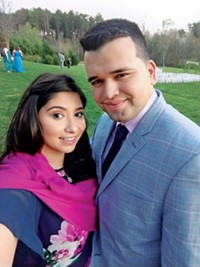×
CEN's 2020 Trailblazers
Paula Hammond: Drug delivery pioneer
Oluwatoyin "Toyin" Asojo: Rare-disease drug hunter
Laura Dassama: Sickle cell fighter
Cordell Hardy: Industrial innovator
Vernon Morris: Atmosphere investigator
Isiah Warner: Materials maestro and mentor
Malika Jeffries-EL: Semiconductor materials maven
Squire Booker: Catalysis champion
Jamel Ali & Patrick Ymele-Leki: Biofilm-busting duo
Carl Bonner: Jack of all chemistries
Cato Laurencin: Tissue regenerator
Kristala Prather: Synthesis warrior
Samson Jenekhe: Polymer powerhouse
Davita Watkins: Supramolecular chemistry sleuth
Karen Akinsanya: Strategic drug discoverer
Lynden Archer: Entrepreneurial educator
Etosha Cave: CO2 converter
Kimberly Jackson: Cancer slayer
Thomas Epps & LaShanda Korley: Upcycling champions
Sherine Obare: Interdisciplinary icon
Historical profiles
Contributors
C&EN's 2020 Trailblazers Celebrating badass women entrepreneurs in chemistry
Advertisement
Grab your lab coat. Let's get started
Welcome!
Welcome!
Create an account below to get 6 C&EN articles per month, receive newsletters and more - all free.
It seems this is your first time logging in online. Please enter the following information to continue.
As an ACS member you automatically get access to this site. All we need is few more details to create your reading experience.
Not you? Sign in with a different account.
Not you? Sign in with a different account.
ERROR 1
ERROR 1
ERROR 2
ERROR 2
ERROR 2
ERROR 2
ERROR 2
Password and Confirm password must match.
If you have an ACS member number, please enter it here so we can link this account to your membership. (optional)
ERROR 2
ACS values your privacy. By submitting your information, you are gaining access to C&EN and subscribing to our weekly newsletter. We use the information you provide to make your reading experience better, and we will never sell your data to third party members.
Materials
Movers And Shakers
One on one with Cordell Hardy
Grad student Roneisha Haney talks with this 3M executive about using science to improve lives
by Roneisha Haney, special to C&EN
February 22, 2021
| A version of this story appeared in
Volume 99, Issue 6
Cordell Hardy knows that successful students become successful adults. With over 15 years of experience in industry, Hardy is now responsible for leading corporate R&D operations, which provides technical infrastructure for 3M’s R&D community. His journey began at Florida A&M University (FAMU), a historically Black university in Tallahassee. Roneisha Haney spoke with Hardy about his career decisions and all the places his career has taken him. This interview has been edited for length and clarity.

Credit: Courtesy of Cordell Hardy
Cordell Hardy
Cordell Hardy
Hometown: Philadelphia
Education: BS, Florida A&M University, 1998; PhD, University of Minnesota, 2003
Current position: Vice president of corporate R&D operations, 3M
Pets: We have a pair of tortoises that I understand will outlive me by decades.
Best professional advice he’s received: Early in my career at 3M, after a couple of years working on projects that were less technical and impactful than I imagined they would be, I considered looking across the company for other positions. My R&D director learned of this and challenged me to create the opportunity rather than look for it.
Roneisha Haney: Can you remember the moment you decided to become a scientist?
Cordell Hardy: I was raised in Philadelphia and went to public city schools throughout my childhood. My mom was an educator, and my dad worked in the finance industry. Neither of them had a technical background, so they didn’t necessarily push me toward science. One thing my mom did do at a very early age was expose me to problem-solving challenges. I didn’t watch many cartoons, but I did enjoy playing chess and playing with building blocks. I think that sort of problem-solving mentality and feeling comfortable tackling problems was something that stuck with me.
As I went through school, I was exposed to different careers. I thought I was going to be a lawyer because I had an uncle I thought was really cool, and he was a lawyer. I had an aunt who was a doctor, and so I thought, “I’m going to be a doctor.” In high school, I particularly enjoyed chemistry and calculus. I did well in the AP [Advanced Placement] classes, and so I was thinking about a field that would allow me to do math and chemistry.
RH: Being from Philly, how did you end up at FAMU?
CH: Around the time I was applying for college, I had the chance to meet FAMU president Frederick Humphries, a very influential figure in FAMU history. He explained to me that if I were to attend FAMU and major in chemical engineering, I would have a scholarship and an internship at a company I had never heard of (at the time) named 3M. So I eagerly accepted the offer. I enjoyed the idea of going to an HBCU [historically Black college or university], going from Philly to Florida, and getting a chance to have a full scholarship. All of that seemed too good to be true. In fact, the scholarship was called the Life-Gets-Better Scholarship. Reflecting on how critical education funding was in my life motivates me to keep looking for ways to provide similar opportunities for future students. In fact, 3M just committed $5 million in scholarship funding for students in the Twin Cities to attend HBCUs.
RH: That’s great to hear! During your time at 3M, what would you say has been one of the most exciting research moments?
CH: I was working on a formulation for an adhesive. I leveraged structure-property relationships and polymer phase behavior that I had studied while earning my PhD. At that time, I had made 500 formulations. I could tell the very moment when the mixture worked as I intended, and I knew we were going to be successful commercializing it. That was a very gratifying moment.
RH: Nice.
CH: That’s just one example. 3M sells tens of thousands of products. And in my 18 years at 3M, I’ve had the chance to touch quite a number of different value-added solutions that are in the market. Concerning COVID-19, 3M produces disposable respirators that have been very much in the news. I’ve had the chance to serve as manager for some of the world’s leading scientists and experts in this field. The depth of polymer science going into formulating and processing electret filter media used to produce respirators is astounding. Then to produce these at controlled cost and high throughput, helping so many to stay safe while facing pandemic risks, is at once impressive and gratifying. It’s a great example of the power of science and its ability to improve lives.
You find your way into those spots by being open minded and doing the best you can on the problem at hand today.
RH: Now that you’re in an executive position, do you miss being in the lab and working hands-on with the development of these different products?
CH: That’s a fair question. I wouldn’t say that it’s better or worse; it’s just the path that I ended up following. I would say that if you are working in a research capacity at a large company and you are formally asked to lead by other senior leaders at the company, it’s generally a good idea to try, right? There are things that I would have never even thought about doing that I’ve ended up doing over the course of my career. You find your way into those spots by being open minded and doing the best you can on the problem at hand today.
RH: It sounds like you’re definitely involved in a number of different projects on a larger scale. What is your typical day like?
CH: Pre-COVID-19 I would get up and go into the office. My entire organization has several hundred people, all outside the US. The role that I fill now has responsibility for providing technical infrastructure for 3M’s R&D community wherever we work around the world. I’ve gone places in the context of my job that I never thought I’d have a chance to experience—China, Thailand, Singapore, Australia, Japan, Mexico, Brazil, Canada, Korea, India, Germany, and the UK. My passport has been stamped quite a bit and that exposure is transformative, especially given how little I traveled growing up.
CH: What are you studying at FAMU?
RH: I’m a fifth-year PhD candidate in chemical engineering. Over the past few years, I have worked to develop polymer-based composite materials to be used as feedstock in 3-D extrusion printing. I’m trying to understand their structure-performance relationships to enhance the performance of polymer-based composites. I’m in my last year, and I will most likely go into industry.
CH: Do you have any companies in mind?
RH: No specific companies, but I am interested in consumer products. I know that’s broad, but it’s similar to what you were saying: I would like to be in a space where I can make a direct impact on our everyday lives.
CH: What made you choose this field? You’re an African American female PhD candidate. How did you get drawn into this space?
RH: I’m a first-generation college student. My mom and grandmother raised me, and I was brought up in Charlotte, North Carolina. I’ve always loved calculus, but I knew I didn’t want to be a teacher. When it came time to choose a major, I spoke with my chemistry teacher, and she introduced me to the field of engineering. During my undergraduate studies, I did an internship with a consulting firm. I worked with the engineers that were on the bachelor’s level, but I would also see the PhDs. They were kind of running the show, but it was behind the scenes. I admired them, and I knew that I wanted to be in a position where I had a specialized and deeper level of understanding.
CH: Good. That sounds really neat. You’re a trailblazer in a lot of different ways.

Credit: Courtesy of Roneisha Haney
Roneisha Haney seeks to understand structure-performance relationships of polymer-based composites used in extrusion printing of lightweight, functional materials.
Roneisha Haney
Hometown: Charlotte, North Carolina
Education: BS, Clemson University, 2016
Current position: PhD candidate, chemical engineering, Florida A&M University, working in Subramanian Ramakrishnan’s lab
First job: Cashier, McDonald’s
Something she did for fun recently: Tried out different authentic Ethiopian recipes
Chemical & Engineering News
ISSN 0009-2347
Copyright © 2024 American Chemical Society






Join the conversation
Contact the reporter
Submit a Letter to the Editor for publication
Engage with us on Twitter